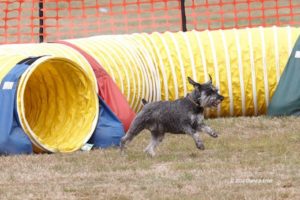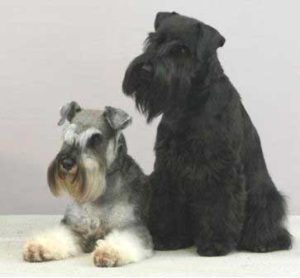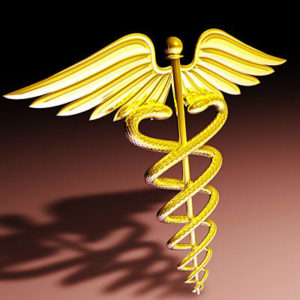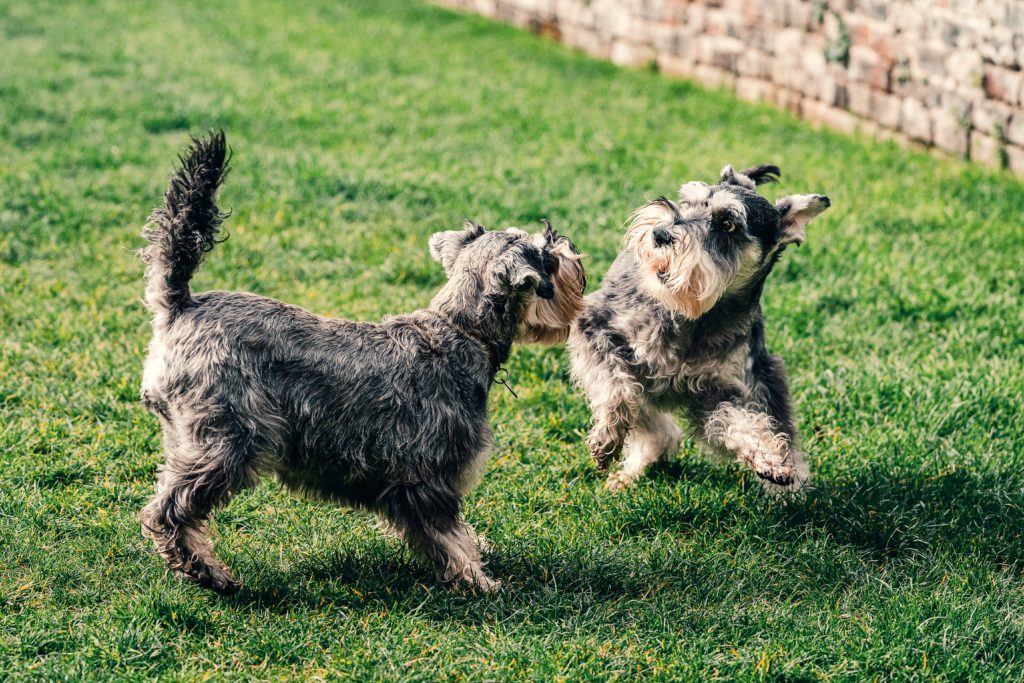Why a Miniature Schnauzer Dog Might Be Right for You? The Miniature Schnauzer is alert and intelligent. These dogs make great family dogs. They are very obedient to verbal commands with consistent training. They are friendly and willing to please. They love having a “job” to do for the family. They make excellent guard dogs. These breeds used a strong bark to warn of danger, but are generally not aggressive.
Miniature Schnauzers dogs are usually gentle with children, but should be supervised when playing. Since these dogs have a high prey drive they are known to hunt birds, snakes and rodents. They will bond best with other, smaller family pets if they are raised together from the time the dog is a puppy.
These dogs may bark to communicate joy of greeting their owner, excitement or displeasure. But this dog to human communication often serves to strengthen the bond between the family and the dog. Miniature Schnauzers are very obedient to verbal commands with consistent training.

Miniature Schnauzer Dog Exercise Requirements
Miniature Schnauzers dogs can make good apartment dogs as they do not require large indoor spaces if they are exercised correctly. These dogs thrive on long, brisk walks on a daily basis and even some off-leash game times.

Grooming a Miniature Schnauzer
These dogs have beautiful long-haired coats that shed discretely. They require regular grooming, including regular shaving and clipping to keep the coat maintained. Many families make regular grooming appointments as they find it easier than grooming the dog themselves due to the required frequency.
It is recommended that the dog is brushed daily to prevent matting. The coat should be trimmed twice per year and regular trimming should be done around the ears and eyes with blunt-nosed scissors.
If trimming would be a new experience for you it is suggested to have the dog groomed professionally for safety reasons. If you want to learn to groom your own Miniature Schnauzer please take the proper steps to insure your safety and that of the dogs.
Where Did Miniature Schnauzers Originate?
The Miniature Schnauzer dogs originated in Germany in the late 19th century. The breed developed from taking Standard sized Schnauzers and breeding them with Poodles and Affenpinschers (a tiny, long-haired dog), to create the smaller sized Miniature Schnauzer.
The primary work of the Miniature Schnauzer was to work on farms throughout Germany. These dogs kept rats and other vermin out of the barns. But these wonderful dogs had other great skills as well and were also used to guard the farm animals and the family. The breed was popular and spread quickly to America, where it was recognized by the American Kennel Club in 1926.

Miniature Schnauzer Health Promotion
The Miniature Schnauzer is generally health. However, like all breeds Miniature Schnauzers have specific sets of health issues that they are more prone too.
Hyperlipidemia – Or high fat levels in the blood which can result in diabetes. Treatable through diet modification, medications and exercise. Your veterinarian can discuss options regarding your dog’s specific results.
Pancreatitis – Inflammation of the pancreas which is an organ that helps with digestion. Diagnosis must be made by a veterinarian upon examination of the sick dog. This condition is painful for the dog, but treatable. Usually no solid foods will be given for a few days to allow the organ and bowel to rest, medication will be given to treat pain, infection and temporarily slow the release of pancreatic enzymes so the dog can recover more comfortably. Usually a full recovery is achieved.
Kidney Stones – Can have many causes in animals and build up in the kidneys and bladder. The dog will experience pain on urination, with red-tinged urine, will void frequently and in small amounts. The dog may be walking low down with the rear legs in a crouched position. If you suspect your dog may have kidney stones, please take the dog to a veterinarian immediately. Treatment usually consists of a modified diet to help dissolve and prevent stones, in some cases surgery has to be done to remove all stones from the dog’s urinary tract. Your veterinarian will advise you based on your individual dog’s condition.
Eye Problems – Eye infection, Cherry eyes and Cataracts.
- Eye infections can cause the dog to have a red and inflamed eye with moderate tearing. Treatment is usually a temporary course of antibiotics. A full recovery is common.
- Cherry eye occurs when the third eyelid of the dog when the tear gland prolapses, resulting in a red bulging tissue mass on the eye. Treatment results in surgery to correct the position of the tear gland.
- A cataract appears as a white clouding over the lens of the eye, usually develops over time and can lead to blindness. Consistent checkups with your veterinarian and essential on prevention and early detection of Cataracts. Your veterinarian can discuss options for treatment based on the severity of the Cataract and your dog’s age and overall general health.
Comedone syndrome can occur in which the dog gets pus-filled lesions on their back. These can be treated with medicated shampoos from the veterinarian, regular and diligent grooming, and a veterinarian recommended diet.
All breeds are susceptible to specific disorders. Each breed can be affected to varying degrees. The idea of listing the common illnesses for each breed is not to discourage you from wanting a specific breed if you find it a perfect fit for your family; but to help you better prepare for the future health of your dog. As well as provide you with the knowledge necessary to get a dog in the best optimum health.
I encourage owners to develop a strong relationship with a consistent veterinarian who the owner and dog both can bond with. Adequate medical care is a financial expense, but a necessity for being a responsible dog owner.
Miniature Schnauzers Are Great For Families of All Ages
The Minatare Schnauzer is an alert dog who has a keen sense of urgency. They love to “work”, learn and train to be productive family members. They are also gentle and love to play hard! Making this breed loving companions for young children (when supervised by an adult) and the non-judgmental confident to the older teenager who can have more accountability with the dog’s care.
See This Miniature Schnauzer Puppy Come Home to This Lovely Couple.For More Information on Mini Schnauzers
https://dogtime.com/dog-breeds/miniature-schnauzer#/slide/1

